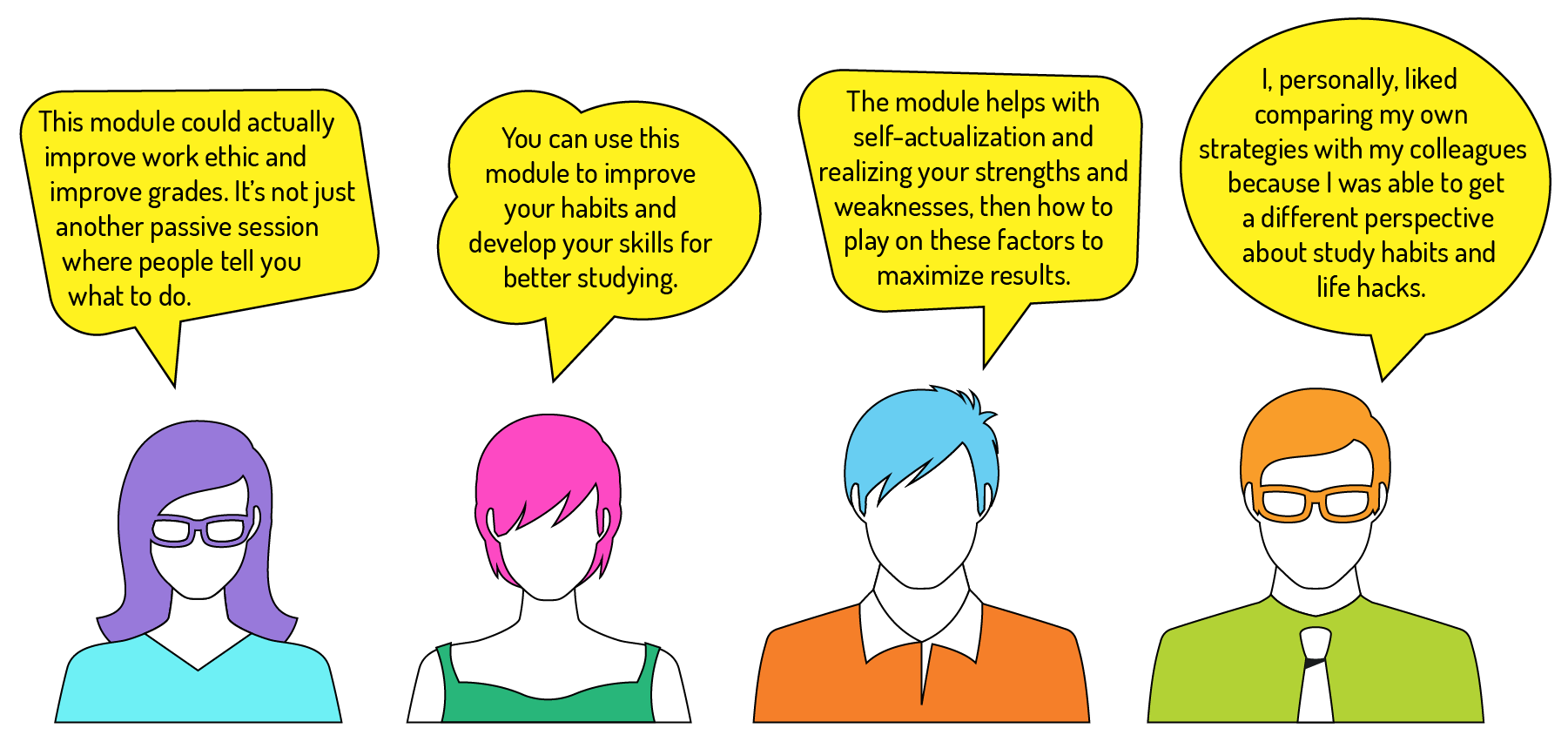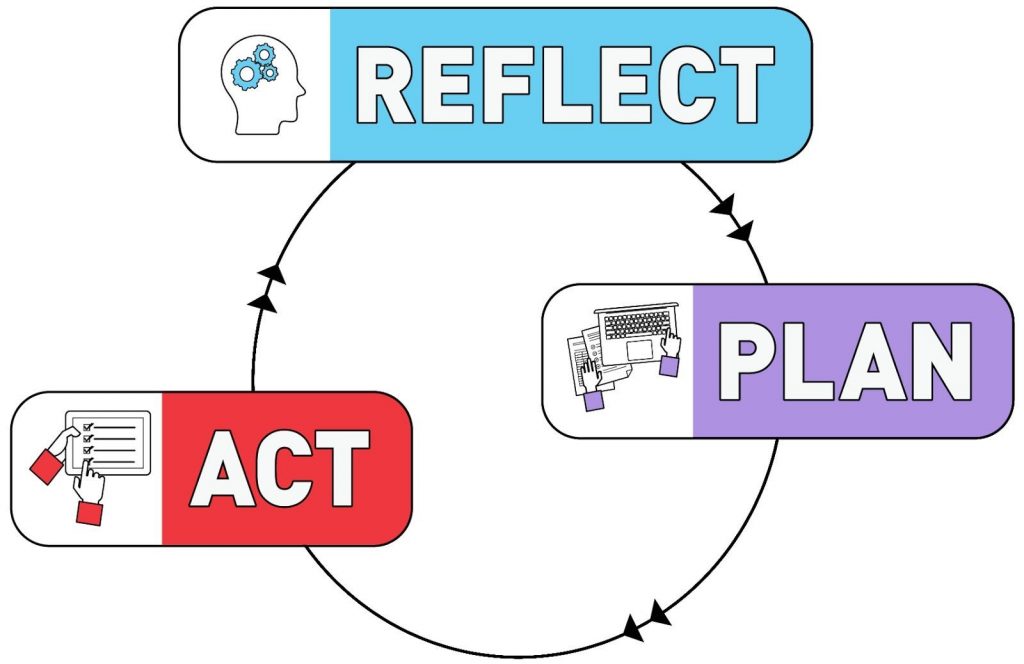Welcome! Time to own your learning!

This Growth & Goals module is designed to help you take greater control of your learning process and guide you through essential components of becoming an efficient and effective learner.
We will achieve these aims by:
- Helping you learn metacognition skills so you may monitor and decide what to do for your learning.
- Guiding you through the process of self-regulated learning (SRL) and goal-setting, which will help you make your goals more attainable.
- Exploring the differences that your mindset can have and teaching you to develop a growth mindset.
- Explore and develop the concepts of mindfulness and resilience.
This video explains the purpose behind the module in more detail, including a bit about how learning works (transcript).
Learning can be difficult and that’s okay! Success takes effort and requires dedication and at times it can be very frustrating. Research has shown that the best learning is happening when it feels the most difficult so don’t worry if you’re feeling this way; it means you’re on the right track!1 Even your professors have struggled (and failed!) too! The goal of this module is to help you develop learning skills and strategies to help you gain success — not only in university but also in your career and even your personal life.
In the past, students found some aspects of the module challenging because it took them out of their comfort zone but they found it was well worth the effort.
“I’ve never met a successful person who had an easy path.” —Robyne Hanley-Dafoe
See what actual students have to say about this module Transcript (.pdf, 55kb):

What is self-regulated learning (SRL) and why should I use it?
Self-Regulated Learning means taking strategic control of how you approach your goals and being prepared and willing to face any challenges and seize any opportunities that might arise as you work to make your goals your reality.2
The self-regulated learning cycle
The SRL cycle has three phases: reflect, plan, and act.

- The REFLECT phase involves looking back on past performances to identify your strengths and the areas you think you need to focus on. You’ll also identify your learning beliefs, your mindset when faced with challenges and your existing knowledge. Finally, you will set and refine the goals you want to achieve.
- During the PLAN phase, you will identify strategies and develop a plan and schedule to achieve your goals from the reflect phase.
- Now that you have goals and a plan it’s time to enter the ACT phase. Here you will carry out your plan, continually monitoring your progress and making adjustments as you feel necessary.
The SRL cycle will repeat multiple times this semester – How did your plan come together? What would you change? What goals did you realize? What goals need more work?
Once the course is finished, you can keep using the SRL cycle in other courses or aspects of your life.
REFERENCES
- Brown, P.C.; Roediger III, H.L.; McDaniel, M.A. Make It Stick: The Science of Successful Learning. Harvard University Press: Cambridge, MA, 2014.
- Zimmerman, B. J. Am. Educ. Res. J. 2008, 45, 166–183.
Metacognition requires you to think about your own thinking and is separated into two parts - knowing what you know and deciding what to do for your learning. This skill is essential for identifying how well you know the prerequisite knowledge, developing study strategies, and learning how to schedule your time.
Self-regulated learning can be achieved through the SRL cycle. The SRL cycle allows you to take strategic control of how you approach your goals and be prepared and willing to face any challenges and seize any opportunities that might arise as you work to make your goals your reality. SRL is achieved in three phases: reflect, plan, and act. Ideally, you should repeat this cycle multiple times as you create goals and tackle challenges.
The belief that your basic abilities can be developed and cultivated through hard work and dedication. Someone with a growth mindset views their basic skills and talents as a starting point, therefore creating a love of learning and resilience that is essential for great accomplishment. Great learners are made, not born.
The ability to be aware of present-time and remain aware throughout your day-to-day experiences. Mindfulness is the ability to resist distraction and temptations, and to remain present and focused on the task at hand. This skill also allows you to control your emotions and respond in a skillful way to emotionally challenging situations, rather than react automatically without careful thinking or emotional control. The skills needed for mindfulness are developed through practice. You must start with simple activities to develop mindful awareness in a variety of situations. Meditation is a common activity to practice awareness and to focus on the present.
The capacity to embrace and accept failure as a part of learning and bounce back. Resiliency applies to your course work, midterms or exams, personal challenges, and other aspects of life.
Reflection involves looking back on your past experiences to identify your strengths and areas you think you need to focus on, as well as identifying your learning beliefs and mindset when faced with challenges. Reflection can be used to help refine the goals you want to achieve.
Planning involves identifying strategies and developing a plan and schedule to achieve your goals you set in the reflect phase. To develop a plan, you will decide on strategies, plan your time, and identify the resources you need. By defining and refining your goals they will become more achievable.
This phase involves putting your plans into action. You will carry out your plan, continue to monitor your progress, and make any adjustments you feel necessary. Always ask yourself, "How am I progressing toward my goals and the course's learning outcomes? What am I doing to achieve my goals?"

